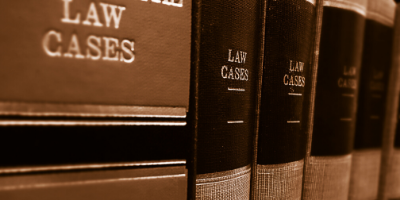Quarterly Journal 51-1
In This Section
 QJ 51.1 - Machine Learning: An Alternative Approach to the Copyright Infringement Question
QJ 51.1 - Machine Learning: An Alternative Approach to the Copyright Infringement Question
Jake Glendenning
Machine Learning is a powerful software tool that relies on digital copying. Whether such copying constitutes copyright infringement is not clear. So far, scholarship on whether machine learning constitutes copyright infringement has focused heavily on whether the “fair use” exception to copyright infringement applies to machine learning. Neither scholarship nor case law has provided a clear answer to whether machine learning is fair use.
However, case law can help determine whether machine learning is infringing in the first place, providing clarity on whether machine learning infringes copyright in some cases where fair use is of little help. Some circuits have held that digital copying, like the copying that takes place in machine learning, necessarily constitutes copyright infringement, while others have interpreted the Copyright Act such that digital copying can sometimes take place without infringing. This article argues that the former interpretation neglects the requirement that a copy be fixed for more than a transitory duration, and that the latter interpretation is more consistent with the text and purpose of the Copyright Act. It argues that courts should use the latter interpretation in future copyright infringement cases involving machine learning. In particular, courts should apply the Second Circuit’s decision in Cartoon Network v. CSC Holdings. Using such an approach, courts may find in many cases that machine learning does not infringe copyright.
 QJ 51.1 - Lasting Impact: Why You Should Care About Court of Customs and Patent Appeal Cases
QJ 51.1 - Lasting Impact: Why You Should Care About Court of Customs and Patent Appeal Cases
Hira Javed, Amanda Murphy, Ph.D., Caitlin O’Connell, Shannon Patrick, Angeline Premraj, Emma Ng, Brady Nash, Stacy Lewis, and Tom Irving
Powerful case law sits within easy reach of practitioners, but most do not use and many do not even know about it. The Court of Customs and Patent Appeals (CCPA), which always sat en banc and was the predecessor to today’s Court of Appeals for the Federal Circuit (CAFC), developed a rich body of jurisprudence relating to U.S. patent law. In this article we will analyze CCPA precedent by points of law and hope that our efforts will inspire the patent bar to apply these CCPA cases.
 QJ 51.1 - Artificial Music: Authorship and Copyrightability of Artificial Intelligence Musical Works
QJ 51.1 - Artificial Music: Authorship and Copyrightability of Artificial Intelligence Musical Works
David Hörger
Artificial Intelligence has started to produce creative musical works with astonishing speed and complexity. This note discusses whether these AI compositions meet the Copyright Act’s authorship requirements. Focusing on the “quantum of creativity” requirement the Supreme Court laid out in Feist Publications v. Rural Telephone Service Company, the note discusses ways creativity might be identified in musical and legal frameworks. This note suggests that copyright might be vested by identifying this creativity through a principle of “Relatable Expression” in musical AIs. Relatable Expression would allow a limited copyright held by a user capable of authorship as long as that user makes a copyrightable expression input into the AI algorithm, which is present in the output score, and then only to the extent that the user’s expression is essential or intertwined to the final work.
 QJ 51.1 - Copyright for Fashion Designs: Slowing Fast Fashion's Harms on Small Designers, Labor, and the Environment
QJ 51.1 - Copyright for Fashion Designs: Slowing Fast Fashion's Harms on Small Designers, Labor, and the Environment
Kyra A. Josephson
The fashion industry is a unique creative industry in that it thrives despite rampant copying. Many scholars have argued against enacting legislation to protect fashion designs, believing that the lack of copyright protection fuels innovation and creativity. This may be true when considering the copying of fashion designs in its typical context: large, established corporations copying designs from luxury brands to sell at much lower prices. However, the same is not true when fast fashion companies copy designs from small, independent designers who are often the individuals developing the most creative designs. The fast fashion industry has become increasingly harmful for small, independent designers in recent years as social media has increased visibility of their designs. In addition to disproportionately harming smaller independent designers, the fast fashion industry continues to exploit cheap labor and harm the environment—making the need for a legal solution especially ripe today. This note recommends reconsidering legislation to provide copyright protection to certain fashion designs to address the harms facing independent designers, the individuals making clothes, and the environment.
 QJ 51.1 - The Biometric Bitcoin: Blockchain Solutions to Consumer Privacy
QJ 51.1 - The Biometric Bitcoin: Blockchain Solutions to Consumer Privacy
Travis Yuille
“You are what you eat” still reigns true, but in the twenty-first century, you are the media you consume. This note highlights how consumers unwittingly trade highly personal information, predictive of their inner most thoughts and desires in exchange for modern convenience— a practice that is largely unregulated on the federal level. Currently, intellectual property laws are ill-equipped to enforce ownership rights for consumers in their personal data. But blockchain technology has introduced unique property-like interests in digital assets such as traceability, chain of title, and single-party ownership. Blockchain technology can be leveraged to administer a new form of intellectual property ownership for consumer biometric data. This note proposes the Consumer Blockchain Privacy Act, a blockchain-centered solution to biometric data ownership.
Upcoming Events
-
.png?sfvrsn=48c235e_1) 2026 Patent Prosecution Bootcamp - Arlington, VA
2026 Patent Prosecution Bootcamp - Arlington, VA
March 4 to 6, 2026 | Up to 1235 minutes, including 60 Ethics minutes
-
 AIPLA CLE Webinar: Damages 2025 Year-in-Review: Lessons and Litigation Strategies
AIPLA CLE Webinar: Damages 2025 Year-in-Review: Lessons and Litigation Strategies
March 11, 2026 2:00 PM to 3:30 PM | Eligible for up to 90 Mins CLE
-
.png?sfvrsn=20d96f46_1) AIPLA LinkedIn Live: What the 2025 AIPLA Economic Survey Reveals About IP Practice Today
AIPLA LinkedIn Live: What the 2025 AIPLA Economic Survey Reveals About IP Practice Today
March 12, 2026 12:00 PM to 12:45 PM
-
2026 Women in IP Global Networking Event
April 16, 2026
The annual Global Networking Event connects intellectual property practitioners from around the world for a day of networking, education, and creating meaningful connections. This year’s theme, Rooted in Real - Women in IP Redefining the Narrative, is an opportunity for the AIPLA Women in IP Law Committee to celebrate authentic experiences, foster genuine connections, and showcase the real stories of women shaping the field of intellectual property law. -
-(1).png?sfvrsn=169c8b82_1) Careers in IP
Careers in IP
April 22, 2026 12:30 PM to 1:30 PM | No CLE

